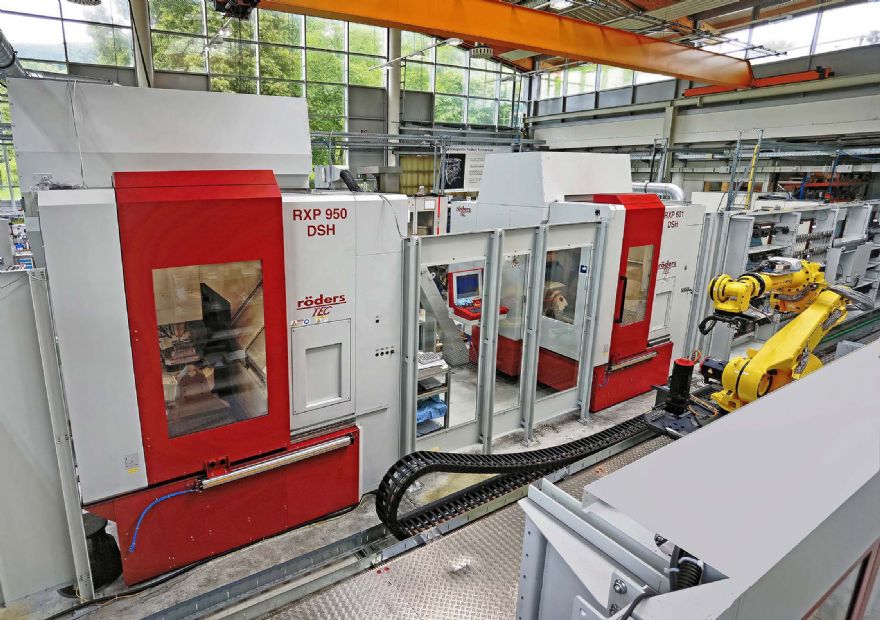 The core of the automated toolmaking cell at Festool's Neidlingen facility are two Roeders RXP machining centres and a handling robot on a linear rail
The core of the automated toolmaking cell at Festool's Neidlingen facility are two Roeders RXP machining centres and a handling robot on a linear railIn mould and die making, individual machining processes are increasingly being combined into automated production cells with integrated handling. The main advantage is a higher degree of machine utilisation, as the systems can operate unattended 24/7. Two prerequisites for realisation of such autonomous systems are more intensive digitalisation of the processes consistent with Industry 4.0 and an increased level of investment.
One company that has followed this automation route is German power tool manufacturer
Festool, which produces complex die casting mould tools and plastic injection moulds for producing its products at a factory in Neidlingen. The toolmaking department has installed a robotic production cell based on machining centres manufactured by German firm, Roeders. Similar technology is available in the UK and Ireland through the latter’s sole agent,
Hurco Europe, High Wycombe.
Jürgen Kopsieker, head of tool and mould making in Neidlingen, explained that his department has to compete with other toolmakers to win business from within the group, while it is also free to offer its services on the open market. The department therefore has no option but to organise itself as a profit centre to ensure it keeps up with market demands in terms of quality, technology and price.

Tomislav Jurisa, manufacturing team coordinator, added: “About three years ago we were still an old-style toolmaking department with five individual machines, three machining centres including a five-axis model plus a wire and a die-sink EDM machine. All were constantly supervised by operators who, in addition to monitoring the machining processes, were responsible for fixturing workpieces, loading and unloading the machines, and setting and changing tools. In addition, supervisors took care of quality assurance.
“Utilisation of the machines was therefore unsatisfactory so, at this point, in mid-2019, we decided to comprehensively upgrade the shop. We wanted an automated manufacturing cell in which milling, EDM, coordinate measuring and aqueous cleaning were fully integrated."
Additionally, to ensure completely unattended operation, the firm was keen to add storage facilities for milling cutters and electrodes, as well as for workpieces mounted on Erowa pallets, with all transport tasks performed by a handling robot. The idea was that operators would simply supply the cell with workpieces and tools and create the NC programs.
Reliable and preciseRealisation of this goal became the responsibility of Roeders, which was chosen for the project for two reasons. First, other companies within the Festool group had many years of experience operating Roeders machining centres and reported that they are reliable and precise. Second, the supplier could point to numerous successful installations of complete solutions based on automated manufacturing cells, including the integration of third-party products from a range of different sources.
To implement the installation, Roeders supplied two of its RXP five-axis machining centres and RMSMain job manager software, which is linked to Festool's IK Office enterprise resource planning system. It also supplied a Fanuc R-2000iC handling robot running on a linear rail. Located within the cell also are a
Hexagon coordinate measuring machine, an
Exeron die-sink EDM machine and an automatic washing system from
Mafac.
In addition, a storage room accommodates 110 palletised workpieces and 258 tools, which is supplemented by the capacity of the tool magazines in the machining centres themselves. Within the cell, a
Roeders RXP 601 DSH primarily machines graphite electrodes, while a larger
RXP 950 DSH is used mainly for hard machining. Materials include 1.2343 hot work tool steel and sometimes 1.2379 cold work tool steel.
Raw material is rough machined in the hardened condition (54-60 HRC) and subsequently finished while still in the same fixture. Compared with the previous procedure of roughing in the soft state, then hardening and finally finishing in a second operation, the new method is significantly faster and less expensive. Cost savings are principally the result of significant reductions in manual operations.
Mr Kopsieker said: “I am thrilled about how well the individual elements in the cell work together. The RMSMain job manager is an open system with interfaces for communication with our own IT system as well as other machine manufacturers’ software. Cooperation was excellent between the Roeders engineers and those at Hexagon, Exeron and Mafac. All systems in the cell worked together without any problems and the projected productivity increase and component quality were reliably achieved right from the start.”
He added that Festool’s staff was fully on-board with the project, not only accepting the necessity and advantages but actively committed, even in stressful situations when ongoing production had to be maintained in the midst of the changeover.
The fact that the Roeders software is based on the Windows operating system made it comparatively easy to learn, which proved to be an advantage. The structure and handling of the programming for the machine controls and the RMSMain job manager were also well adapted to a machine shop, so the training needed was minimal.